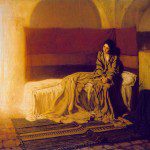“And we must look far deeper into the soul of man for the thing that produces friendliness.”
– G.K. Chesterton
It seemed quite simple. They hoped to become new friends. A summer day in 1908 found Henry and William stopping to say hello to their new neighbor, G.K. Chesterton. And Chesterton was a nervous, but thoughtful host. Renting a vacation home in the small town of Rye in East Sussex, the thirty-four year old journalist and author anticipated spending time with his wife, Francis, and writing. Little did he know the dignified company that would be living next door and dropping by: Henry and William James, the famous brothers celebrated as a novelist and psychologist-philosopher respectively. Gallant and proper, the two frock-coated giants engulfed the house while Chesterton provided polite, uncharacteristically apprehensive, hospitality. Thus far, it seemed an auspicious start to making new friends.
And then, came Belloc. As Chesterton described the circumstance,
“I heard from the front-garden a loud bellowing noise resembling that of an impatient fog-horn. I knew, however, that it was not a fog-horn; because it was roaring out, “Gilbert! Gilbert!” and was like only one voice in the world…I knew it was Belloc.”
Belloc. Hilaire Belloc. An Englishman with French roots. A poet, journalist, politician, and philosophical streetfighter. Above all, a devout Catholic. And now, into the presence of the austere, staid company of the James brothers with their “balanced tea cups and tentative sentences” barged the unshaven, unbathed Belloc, returning broke after weeks on a French pilgrimage, bellowing for beer and bacon. To Chesterton, Hilaire Belloc was an old friend.
Hilaire Belloc and G.K. Chesterton became fast friends after first meeting years before. Belloc told Chesterton that he wrote very well. Chesterton, in retrospect, recorded that “[Belloc] has made the greatest fight for good things of all the men of my time.” They shared strengths and complemented each other’s weaknesses. Between them, they wrote detective fiction and polemics, plays and travelogues, religious apologetics and bawdy poems. Hilaire was feisty, passionate and stubborn. G.K. was genial, mirthful and winsome. They were uncompromising in their honesty. They were unswerving in their loyalty. Chesterton and Belloc became such a pair of old friends that playwright George Bernard Shaw puckishly morphed them into a mythically-blended creature, the “ChesterBelloc”.
Belloc was an old friend. He could generate uproarious laughter with his indecorous poems,
“I pray good beef & I pray good beer
This holy night of all the year
But I pay detestable drink for them
That give no honor to BethlehemMay all good fellows that here agree
Drink Audit Ale in heaven with me
And may all my enemies go to hell!
Noel! Noel! Noel! Noel!
May all my enemies go to hell!”
And yet a man of such curt humor was also capable of a sweet and thoughtful insight. Belloc wrote to Chesterton shortly after Chesterton’s conversion to Catholicism explaining his very personal and deep devotion to the Faith,
“The thing I have to say is this (I could not have said it before your [conversion]: I can say it now. Before it would have been like a selected pleading). The Catholic Church is the exponent of Reality. It is true. Its doctrines in matters large and small are statements of what is…My conclusion – and that of all men who have ever once seen it – is the faith. Corporate, organized, a personality, teaching. A thing, not a theory. It.”
Old friends, like Belloc and Chesterton, start new with an uncertain encounter which grows into the most robust of bonds. They first appreciate each other’s strengths and then struggle through each other’s weaknesses. Old friends never stop learning about each other and yet simultaneously feel infinitely familiar with one another. Old friends laugh hard and fight hard and celebrate hard and suffer hard – always together. They share moments soaring with joy and then moments crushed with pain. And in this quick life of ours, these enduring friendships can at times feel frighteningly fleeting. So when Chesterton died (at age 62) and his funeral Mass had ended, Belloc was found alone in a pub, inconsolable. He was nursing a pint of beer – weeping. Weeping for his old friend.
These old friends are precious…but in our abbreviated lives, is the mirth and exuberance found in our old friends overshadowed by the pain and loss that may come tragically too soon? Perhaps it was Chesterton who best described the enduring value of old friends and the divine compensation we hope will rekindle the joys and soothe the bitter tears of loss,
“But we have a long way to travel before we get back to what Dickens meant: and the passage is along a rambling English road, a twisting road such as Mr. Pickwick travelled. But this at least is part of what he meant; that comradeship and serious joy are not interludes in our travel; but that rather our travels are interludes in comradeship and joy, which through God shall endure for ever. The inn does not point to the road; the road points to the inn. And all roads point at last to an ultimate inn, where we shall meet Dickens and all his characters: and when we drink again it shall be from the great flagons in the tavern at the end of the world.”
Yes. Truly. May God bless our friends, old and new alike.












